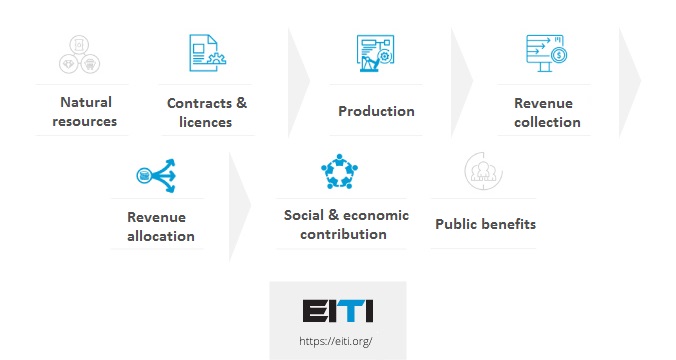
Dedicated to exploit the natural resources, the extractive industry has become a relevant sector in many international economies. According to the World Bank’s handbook, The Extractive Industries Sector: Essentials for Economists, Public Finance Professionals, and Policy Makers, the sector accounts for at least 20 percent of total exports, and at least 20 percent of government revenue, in 29 developing countries.
In this global context, different international initiatives work to boost the release of data and, thus, to promote the accountability and transparency of this industry. This is the case of EITI (the Extractive Industries Transparency Initiative), a multi-stakeholder coalition of governments, companies, investors, civil society organisations, and partner organisations that fight for the open and accountable management of natural resources in the world. In this way, it is possible to increase public trust and dialogue, improve governance, attract investment, and manage and enhance growth so that citizens receive financial and societal benefits from a country’s natural resources.

To those countries that want to join the EITI, the initiative has created a standard which guarantees that the data along the extractive industry value chain, from the point of extraction to the obtained revenues, are public. The disclosure of this information lets us know how licenses and contracts are allocated, who benefits from this operations, and, above all, how local populations are affected.
Some countries have already implemented the EITI standard, facing the challenge of transforming the EI information into open data. For instance, in 2014 USA launched a data portal where users can access, explore and re-use the national EI data, with the goal of ensuring that taxpayers are receiving every dollar due for extraction of natural resources. In Europe, Norway is the current leader thanks to the data portal about oil and gas activities of the country, including information about the production, reserves, licences and revenues.
Given its global relevance, the program of events previous to the International Open Data Conference includes several workshops from 3rd to 5th October in Madrid which will discuss about open data in the extractive industry, in order to share good practices around transparency of natural resources; discuss strategies, challenges and solutions for between countries, and sharing of materials, resources and expertise between stakeholders; identify the needs and ways to create an environment for the release and use of data on government platforms and increase the capacity to address data management and implement systems for disclosure.
Thus, the open data movement can be the driver to transform the extractive industry into an innovative sector that contributes to social and economic development in each region, ensuring the transparency and accountability of processes and promoting the participation of civil society in the exploitation of natural resources.